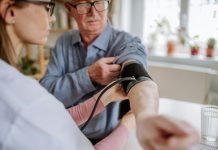
In a new study from Aarhus University Hospital, researchers found that people who have had a heart attack may be slightly less likely than people in the general population to develop Parkinson’s disease later in life.
Parkinson’s disease is a brain disorder characterized by progressive loss of physical movement, including tremors, slow or slurred speech, and/or stiffness or limited range of motion for walking and other physical activities.
There is no cure for Parkinson’s disease, and it is also associated with behavioral changes, depression, memory loss, and fatigue.
Secondary parkinsonism, which has symptoms similar to Parkinson’s disease, may be caused by stroke, psychiatric or cardiovascular medications, or other illnesses.
Previous studies have shown that after a heart attack, the risk of neurovascular complications such as ischemic stroke (clot-caused stroke) or vascular dementia is markedly increased. Therefore, the new findings are somewhat surprising.
In the current study, researchers examined the health registries from the Danish National Health Service.
They compared the risk of Parkinson’s disease and secondary parkinsonism among about 182,000 patients who had a first-time heart attack between 1995 and 2016 (average age 71 years old; 62% male) and more than 909,000 controls matched for age, sex, and year of heart attack diagnosis.
Over a maximum continual follow-up of 21 years, after adjusting for a wide range of potential confounding factors, the analysis found that when compared to the control group:
There was a 20% lower risk of Parkinson’s disease among people who had a heart attack; and
a 28% lower risk of secondary parkinsonism among those who had a heart attack.
The findings suggest that cardiac rehabilitation should be focused on preventing ischemic stroke, vascular dementia and other cardiovascular diseases such as a new heart attack and heart failure, since the risk of Parkinson’s appears to be decreased in these patients, in comparison to the general population.
If you care about Parkinson’s disease, please read studies that these high blood pressure drugs may prevent dementia, Parkinson’s, Huntington’s ,and coffee may help fight common dementia and Parkinson’s disease.
For more information about Parkinson’s disease, please see recent studies that this prostate disease drug may help lower risk of Parkinson’s disease, and results showing that these vitamins may help prevent Parkinson’s disease.
The study was conducted by Jens Sundbøll et al., and published in Journal of the American Heart Association.
Copyright © 2022 Knowridge Science Report. All rights reserved.




